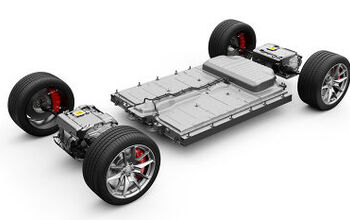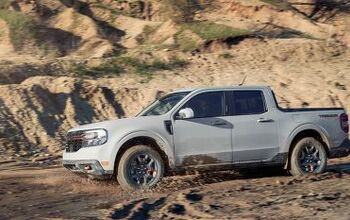QOTD: Why Hasn't Anyone Out-Gas Mileaged The Prius?

Fifty-one miles per gallon city. Forty-eight miles per gallon highway. Still the best numbers in the industry for nearly a decade now.
Yes, ladies and gentlemen, I’m referring to the Toyota Prius, which is a 5-door hatchback that looks a bit like an egg mated with a shopping cart. It’s been a decade since the Prius came out in hatchback form, and a decade since it achieved those impressive fuel economy figures: 51 miles per gallon city. 48 miles per gallon highway. And still, no one has unseated the Prius.
It hasn’t been without trying. After the original Honda Insight failed, Honda came out with a Prius-looking second-generation Insight trying to dethrone the king. But it didn’t even come close, with fuel economy figures reaching just 41 miles per gallon city and 44 mpg on the highway. Even the Civic Hybrid, in its current form, can manage only 44 mpg city and 47 mpg highway.
And then there are the other challengers. The Ford C-MAX, also a hybrid-only 5-door hatchback, originally seemed like it might be close to the Prius’s EPA ratings — until people started complaining that they couldn’t come anywhere near Ford’s published figures. Down the C-MAX’s numbers went to their current resting place of 42 mpg city and 37 mpg on the highway.
The Volkswagen Jetta Hybrid gets close at 42 mpg city and 48 mpg highway. So does the Honda Accord Hybrid, at 50 mpg city and 45 mpg highway. And the Ford Fusion Hybrid, at 44 mpg city and 44 mpg highway. But none of them can unseat the reigning king and champion, the Toyota Prius.
Interestingly, even Toyota doesn’t seem to be able to top the Prius. Proof of that came a few years back, when they debuted the even smaller Prius c, a subcompact hatchback version of the Prius designed to provide a low-cost alternative to the iconic car. Despite a smaller engine, a smaller size, and less weight, its fuel economy ratings are 53 mpg city and 46 mpg highway — no better combined than the Prius’s 51 mpg city and 48 mpg highway.
So how does the Prius do it? It isn’t by cheating. The people on Fuelly all seem to report somewhere between 47 and 49 miles per gallon, which is right there on par with the EPA’s estimate. By comparison, second-generation Honda Insight people all seem to be somewhere between 43 and 45 miles per gallon.
We must assume that the Prius gets its amazing miles per gallon by honest-to-goodness engineering: a streamlined body, a tremendously efficient engine, and a wide range of other modifications that gives this car a leg up on all of its wannabe-Prius competitors. Which brings me to ask: why hasn’t anyone topped the Prius?
If it’s just engineering, someone can certainly do it. After all, this isn’t rocket science. Tear down the Prius. See what they did. Replicate it. This is how Volkswagen created its current-generation Passat, although unfortunately the car they used as the benchmark was a 1995 Camry CE.
So maybe people don’t want to replicate the Prius. What I’m thinking is, other automakers have decided the Prius is old news, and they want to focus instead on plug-in hybrids and electric cars which are all the rage these days. But here’s the problem with that: last year, Toyota sold 207,000 units of the Prius family, compared to roughly 19,000 Chevy Volts, and 30,000 Nissan Leafs. In other words: although electric cars might be all the rage, the “highly efficient hybrid” segment is still exponentially larger than the plug-in EV class.
And so I ask: in today’s world of people trying to conserve energy, save the planet, and lower their carbon footprint, how is it still possible that nobody has managed to equal the Toyota Prius in terms of fuel economy? How is it possible that nobody has beaten it? How has nobody entered this wildly profitable, popular segment and given the Prius a (slow, quiet) run for its money? Because the way it stands now, it doesn’t seem like General Motors should’ve devoted all that energy to making the Chevy Volt. Instead, they should’ve made a Chevy Prius.

More by Doug DeMuro
Latest Car Reviews
Read moreLatest Product Reviews
Read moreRecent Comments
- 3SpeedAutomatic Nope....
- Bd2 Looking forward to flooding the rental lots with Hyundai and Kia models, this is just one obstacle now eliminated.
- Kcflyer keep the color. lose the stupid front design. make it reliable, at least as reliable as a base 911. Then and only then is it somewhat worthy of that price.
- FreedMike I'm not sure why anyone would choose this over an A8 or S-class.
- FreedMike I think the manufacturers who are discontinuing affordable small and midsize cars in favor of more expensive crossovers (that are built on the same platforms and use the same mechanicals as said small and midsize cars) may well live to rue that decision. Having said that, though, at least GM is offering decent entry level stuff beyond the Malibu, so good for them.


































Comments
Join the conversation
Even though Prius is a marvelous piece of engineering, I fail to see the savings from owning one. The _base_ Prius II that does not even have an electric drivers seat has MSRP of $24K. For under $20K, you can buy a well optioned Corolla or Mazda 3. And you have to drive well over 150,000 miles to recover those 4K in fuel savings. Or another comparison, is Accord LX vs base Prius. Accord LX has MSRP of 22K, but it is a larger classier, much faster car, that rides a lot better than Prius, and you still get 30mpg average. Again, you'd have to drive 60-100K miles in a Prius to simply make up the 2K you lost by not buying the Accord LX, and you are still stuck in that tin can pinching the pennies. Honestly, Prius has the ride, road noise, and wind noise level of a $15K car. That's the problem with it. If the base Prius II cost maybe 22K, and a well optioned model was 24-25K, then maybe, just maybe it would make a better economy argument. Probably Toyota's competition realizes that there exist only so many myopic consumers with no calculator and if there was a second Prius-like car on the market, there would not be enough consumer demand to make it profitable.
I guess someone hasn't been paying attention to the spy photos of the new Hyundai "Prius" in development.